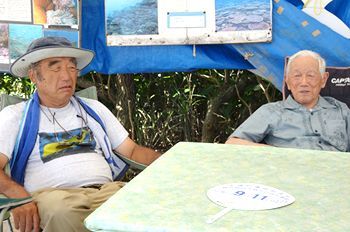Environmental economics pioneer Kenichi Miyamoto calls base expansion “tragic”

Osaka City University professor emeritus Kenichi Miyamoto visits Henoko, Nago City and talks to Council Against the Helicopter Base representative Hiroshi Ashitomi on August 14 on the beach in Henoko, Nago City.
August 15, 2016 Ryukyu Shimpo
On August 14, Kenichi Miyamoto, Osaka City University professor emeritus and internationally recognized pioneer in the field of environmental economics, visited Henoko, Nago City, the planned relocation site for U.S. Marine Corps Air Station Futenma. In Henoko, Miyamoto met and engaged in discussion with Hiroshi Ashitomi, representative of the Council Against the Helicopter Base, who has long been protesting in opposition to the construction of a new U.S. base in Henoko. “The public policy of expanding the base here is being forced [on Okinawa]. It is tragic that this is being allowed to happen. The fundamental nature of the public good entails the establishment of human rights for all citizens,” said Miyamoto.
Before meeting with Ashitomi, Miyamoto took a boat from the Teima fishing port to observe the colonies of blue coral on the ocean floor in Oura Bay. “I was able to see how large the coral reef here is,” said Miyamoto. “It is a magnificent reef, and it would clearly be wrong to destroy it.”
Miyamoto is a leading authority in the field of environmental economics, known for coining the Japanese word “kōgai,” which literally translates as “public harm” and refers to environmental pollution. He pursued the issue of pollution as a price paid for Japan’s period of rapid economic growth starting in the 1960s, and has studied and examined issues of pollution in the field for over half a century. He has also worked to find solutions to issues such as Japan’s “four big pollution diseases,” including so-called “Yokkaichi asthma” caused by sulfur dioxide pollution. He approaches the issues from a standpoint of respect for basic human rights and the independence of local governments.
Miyamoto had also planned to visit Takae, Higashi Village, where helipads are being built, on the same day, but had to cancel the trip out of concern for his health. “Mr. Miyamoto’s advice and the Japan Environmental Council [which he founded] are very important,” said Ashitomi. “It is essential to convey internationally the base issues faced by Okinawa.”
Miyamoto plans to visit Okinawa again in October for a meeting of the Japan Environmental Council.
(English translation by T&CT and Sandi Aritza)
Previous Article:Actress Sayuri Yoshinaga questions why Japanese government does not bring Marines to Tokyo
Next Article:Editorial: Removal of reporters in Takae violates freedom of the press
[Similar Articles]
- Seventeen groups issue a statement to seek the environmental protection of Henoko and Oura Bay based on the Ramsar Convention
- New Henoko base construction may destroy area’s coral reef
- 80 percent of Ishigaki Island’s coral reefs becoming bleached
- Shimagurumi delegation to visit US, tell US congress members about governor’s revocation of Henoko landfill
- Group of Japanese experts from various fields release joint statement calling for the retraction of Henoko base construction plan
 Webcam(Kokusai Street)
Webcam(Kokusai Street)


